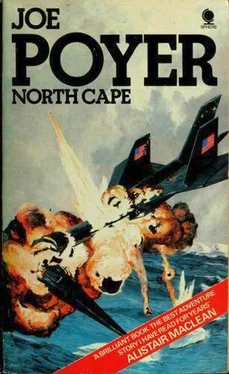Within the second hour the wind rose to what Folsom judged was fifty miles an hour. It had also backed several points until it was blowing from almost due north. The wind carried the scent of the icy wastes from the Great Barrier, less than two hundred miles north, bringing with it the same fierce temperatures and flying. ice spicules that scoured the ice of the polar cap into tortured shapes. Folsom traveled now with the compass constantly in his hand, fighting to keep them on a course leading generally westward. But the proximity of the north magnetic pole made it all but useless for more than general direction keeping. As the wind increased, so did the labor involved in walking. The snow had drifted to three and four feet deep in some places, and where it hadn’t drifted at all it stood at least two feet deep. The snowshoes were of some help in keeping them above the crust, but the extra work of adjusting their gait to the peculiarities of the webbed shoes made Folsom wonder if they were not just trading one exhaustion for another. The only thing that seemed to be in their favor was that the top of the cliffs was fairly level, sloping gently downhill to the south. Folsom was under no illusions that the Russians would stop to wait out the storm. They would assume that their quarry was also taking every advantage the storm offered. Once they found the damaged lifeboat but no sign of a camp, it would not take them long to conclude that they were heading for the Norwegian naval base. The only hope the Russians would then have would be to cut them off before they gained the naval installation. And Folsom knew damned well that, if they did call for help, either the submarine or Soviet aircraft would arrive in quick order to shell the hell out of them. With these thoughts to keep him company, Folsom grimly forced them on through the Arctic desert.
For Teleman the hours passed endlessly in a haze of pain as tired muscles and joints protested every movement. The cold was more than insidious. In his weakened condition it was waiting to kill him if just once he let down his guard. His only hope was to keep moving, forcing his body to make optimum use of the slender reserves twenty-four hours of sleep had rebuilt. What would happen when these reserves were exhausted he knew very well. At one time Teleman had voraciously read everything he could find on Arctic and Antarctic exploration. He knew, for instance, that in spite of the tremendous will to live that had infected Scott and his crew in the Antarctic, it had been impossible for them to travel that last eleven miles to the supply cache that had literally meant life or death. And now he understood why. He was fast reaching that point where it becomes impossible for the body to put out that last ounce of strength, that last bit of will that forces dying muscles to one more movement. The intense cold of the Arctic activated the body’s main defense system against cold, involuntary shivering, but it also killed after a few hours. Shivering is an involuntary or autonomous muscle movement that cannot be controlled consciously. And it takes energy to shiver, and a prolonged bout at last saps all reserves. Then the body dies because there is simply no more heat to power the machine.
Teleman was shivering, shivering violently. He had never been so cold in his life. And in spite of the Arctic clothing and the heavy parka, the cold cut as if they were merely tissue. The first touches of frost had long since begun to reach through the insulated soles of his boots. By now, after four hours of walking, his feet were completely numb. He hated to think of what was going to happen when his feet and hands began to thaw… if they ever did.
From then on he stumbled constantly, half supported by the giant McPherson, whose strength seemed endless. Through the snow mask Teleman could feel the skin of his face grow numb, then contract in the cold as if it were trying to pull his skull apart. Feebly he rubbed his cheeks and nose with gloved hands, and the pain of even this faint bit of returning circulation was fantastic.
As they traveled farther across the rough crags of the rear cliff tops, clambering over rock outcroppings to slide painfully down the snow-and ice-slick far sides, Teleman marveled, with the part of his mind that was still conscious, at the strength that McPherson, was exhibiting. Even now as Folsom and Gadsen were beginning to slow, their movements becoming more and more unsteady as they fought against the exhausting wind and cold, McPherson still half carried him, still showed no signs of weariness.
After the sixth hour Folsom began to call five-minute halts every half hour or so, but after the morning and the brief brightening of the five to ten minutes of clouded sunlight at noon, they rested standing. No one dared sit or lie as the cold deepened and their exhaustion grew. Once down, they knew they would never be able to get up again. Finally even McPherson dared not rest for more than a few moments. By late afternoon they had entered another branch of the forest, this one clutching the coast. The pounding of the surf was violent in the almost still crystal air. The wind had suddenly died away to a light breeze and the continuing heavy snowfall did little to muffle the crash of waves against unyielding stone. The trees, stunted and twisted by years of storm, were widely spaced and unchoked with the undergrowth that had marked the inland forest. But the trees, forced to grow lower, made up for the lack of brush with low-hanging branches pregnant with fresh snow. At 1600 that afternoon the wind had stopped completely. The tired party of four men came to a stop. For the last hour Teleman had been traveling in a semi-daze, barely conscious. But now even he was revived momentarily. Folsom peeled back his face mask and hood and the others followed suit. He turned his head in a slow circle, searching for any trace of breeze. The air was silent, barely moving. The intense cold seemed even more pressing now in spite of a lack of wind to stir it across their exposed faces. The wind-scattered trees of the stunted forest were immobile, drooping even lower with the steadily accumulating snow.
The small party began to stumble forward again, reeling under the load of their weariness and the heavy, depressing atmosphere that had descended with the cessation of the wind. Even McPherson was growing exhausted. His gait grew less and less steady. Teleman exerted a tremendous effort and managed to walk upright by himself for a few moments before the snowshoes caused him to stumble. From then on each of the three sailors took turns supporting him.
A muffled crack sounded somewhere behind them. Instantly they were on the ground, searching for cover in the meager waste. For long moments they lay, all thoughts of their weariness forgotten. Folsom shifted his carbine and peered over the barrel, trying to penetrate the snow-filled landscape, then after a moment he got shakily to his feet, laughing softly.
“Come on you deadbeats. Up and at ’em.” He helped Teleman up as another sharp rifle report was beard.
“Trees,” he explained shortly. “The cold is beginning to crack the damned trees.” By 1800 they reached the edge of the tundra. The jut of the coast pulled away to the north at this point, heading into a region of higher ground which the line of cliffs rode in lazy undulations of crags and clefts. McPherson edged out into the beginning of the tundra plain and knelt to brush the accumulated snow from the frozen dirt and rotting vegetation that overlay the hard surface of never-melting ice. After a few moments he motioned the others out.
Folsom; Gadsen, and Teleman followed him out to where he was staring at the darkness that obscured the way ahead. Behind them a three-quarter moon was beginning to break through the rack of clouds, its pale gold light lending a warm tint to the ghostly, wasted landscape. Teleman reversed his carbine and sank to his knees, leaning on the gun for support. He had been profoundly grateful when the wind had died; at these temperatures snow froze into solid crystals of ice, tiny particles that, whipped by the wind, worked their way between snow mask and hood and glove and cuff. After hours of exposure Teleman felt as if his wrists and neck were ringed by crusts of burning ice. His gratitude had been short-lived, however. As the wind had died the cold had deepened, until now he guessed it was close to forty below zero.
Читать дальше












